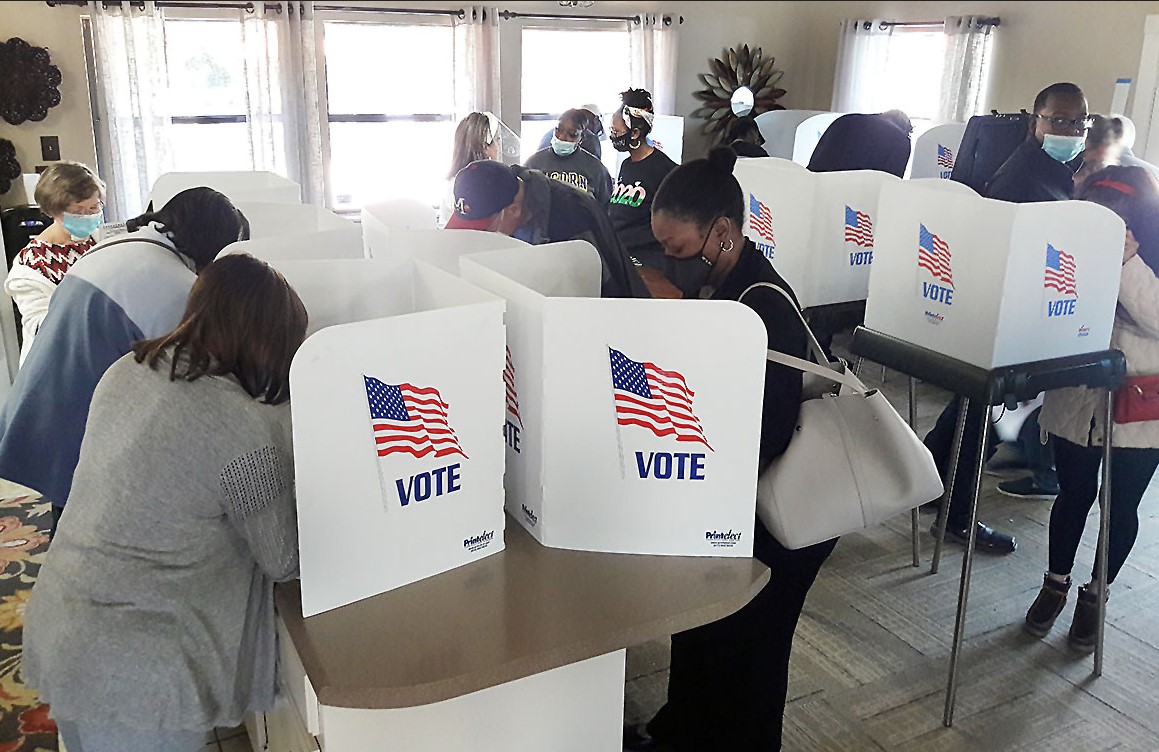States
Mississippi’s November Governor’s Race May Include Racial Runoff Elections

Mississippi’s November Governor’s Race
A runoff election, a Mississippi first, is a hot topic ahead of the November governor’s race. If neither candidate wins, Republican incumbent Tate Reeves and Democratic challenger Brandon Presley may face a runoff. Runoff elections have a terrible history of discriminatory practices dating back to the post-Civil War period.
Only Mississippi and Georgia need general election runoffs, which are rare nationally. The ‘jungle primary’ system is peculiar to Louisiana. After Reconstruction, these and party primary runoffs in 10 predominantly Southern states were used to discourage African-American voter turnout.
The historical backdrop shows the purpose to disenfranchise Black voters and prevent their political rise. The Southern power structure purposefully created runoffs to make it harder for underprivileged populations to participate in numerous election cycles.
In the 1960s, the US Supreme Court abolished Georgia’s county unit structure, leading to the runoff procedure. Denmark Grover, who directed the Georgia runoff, admitted its racial bias.
Mississippi’s elimination of a constitutional clause preventing Black people from running for statewide office in 2020 added another heated factor to the runoff race. Mississippi has a large Black population but has never popularly elected a Black statewide candidate.
These racially fraught legacies resound in both states’ elections. In previous Georgia runoffs, Black candidates, notably now-Senator Raphael Warnock, won, demonstrating a subtle change in history.
As Mississippi Prepares For A Runoff Election, Its Beginnings Remind Us Of How Racist Practices Have Shaped Politics.
Racism In Runoff Elections
Runoff elections in Mississippi and Georgia have a disturbing history of institutional prejudice. Runoff elections were created post-Civil War to limit African-American political participation. In the South, where the white power structure attempted to keep control, runoff elections were added to dissuade Black voting. These election methods were designed to limit Black people’s political rights and restrict their public office participation.
Black Political Participation Impact
In Mississippi and Georgia, racially driven election procedures have harmed Black political involvement. Despite legislative and constitutional improvements, racial laws continue to impact politics, hindering Black politicians’ electoral success. Removing obstacles to Black statewide candidates in Mississippi in 2020 introduced the runoff election system, adding to their challenges. The historical backdrop of Georgia’s runoff mechanism highlights the ongoing gaps that undermine Black representation and political agency, emphasizing the necessity to address electoral institutional inequalities.
Contemporary Realities And Shifting Narratives
Runoff elections have a long history of racial prejudice, but recent political upheavals have changed the narrative. The recent victory of Georgia Senator Raphael Warnock, who had significant Black voter support, marks a turning point in fighting entrenched racist systems. These occurrences show that the Black community is becoming more resilient and determined to participate in and influence elections. As states like Mississippi prepare for runoff elections, racism and its effects on Black political representation remain a crucial issue, emphasizing the need for equitable electoral practices and inclusive democratic processes.
Resilience And Activism Despite Racism
Runoff elections’ racially fraught past has challenged the Black community, but its endurance and activity have shaped the political debate. Despite electoral institutional barriers, Black activists and community leaders have promoted voter education, civic participation, and comprehensive election changes. Advocacy groups and grassroots organizations are significant agents of change, opposing discrimination and promoting political equity. These deliberate actions to promote Black voices and ensure inclusive political participation have transformed the community, encouraging empowerment and togetherness.
Read Also: Fighting Racism And Promoting Equity: ECRI’s Georgia Mission
Law Reform And Historical Injustices
Recent attempts have tried to redress past inequities in Mississippi and Georgia’s election systems via substantial legislative revisions. Legislation to remove racially driven impediments to political participation has gained popularity, renewing the need for a more inclusive and equal electoral environment. Legislation to promote fair and transparent elections, encourage community involvement, and protect underrepresented groups’ democratic rights has become a milestone in the battle against electoral racism. These legislative efforts show a shared desire to abolish discrimination and create a more fair and representative democratic system.
Building Fair Election Infrastructures And Boosting Representation
Alongside legal improvements, fair electoral infrastructures and increased representation are essential to an inclusive and participatory democratic process. Voter protection, polling station access, and voter enfranchisement have become vital tools in protecting vulnerable populations’ voting rights. Diversity in political leadership, mentoring, and support for young Black candidates have also helped create a more representative and inclusive political ecology. Stakeholders are building a more fair and just political environment that includes all community views and experiences by promoting inclusive electoral infrastructures and varied leadership pipelines.
Electoral Equity Intersectional Advocacy And Coalition Building
Intersectional activism and coalition building have become potent weapons for electoral justice and systemic change in the complex interaction of race, class, and political power. Activists and advocacy organizations highlight oppressed populations’ intersectional experiences via collaborative collaborations since social injustices are linked. The political equity movement has grown by partnering with grassroots organizations, civil rights groups, and social justice activists, amplifying historically marginalized communities. This intersectional lobbying method recognizes structural oppression’s complexity and emphasizes unity and inclusion in the struggle for electoral justice.
Education, Empowerment, And Inclusive Democracy’s Future
Education, empowerment, and an educated electorate actively participating in politics are essential to inclusive democracy. Education on the history of electoral discrimination, varied representation, and active civic involvement has helped make the public more politically informed and involved. These educational programs have empowered citizens with the information and skills to navigate the political terrain, enabling community engagement in building democratic government. The future of inclusive democracy requires a continuing commitment to comprehensive education programs that allow people to become active players in electoral equality and justice.












You must be logged in to post a comment Login